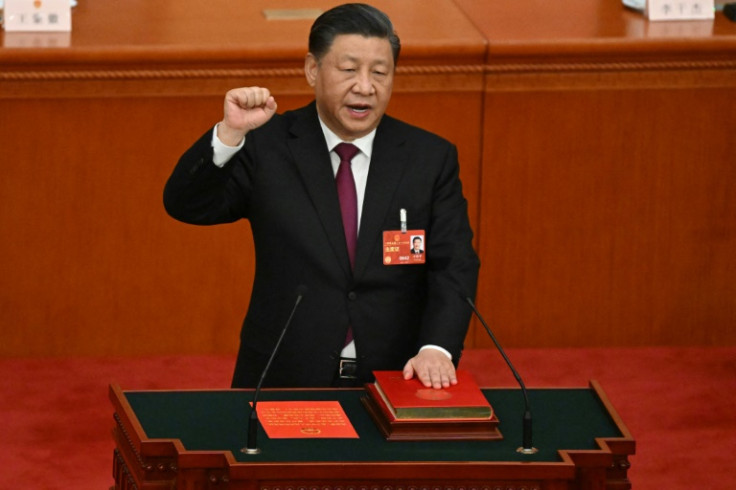Xi's Corruption Crackdown Targets Embattled Finance Sector

Xi Jinping's crackdown on official corruption has ripped through a secretive missile force, the Communist Party elite, the national football team, and now risks hammering a finance industry already grappling with an economic slowdown.
Since rising to power a decade ago, Xi has waged a constant campaign against deep-seated graft that has led to the punishment of at least 4.7 million officials, according to a 2022 report by the state-run Global Times.
The number of publicly disclosed investigations into senior-level officials rose by 40 percent last year compared with 2022, according to a tally by the Hong Kong-based news outlet South China Morning Post.
And Xi has lately vowed to root out deep-seated malfeasance in the finance, banking and state-owned sectors even as a property crisis, high local government debt and chronically low consumption sap economic vitality.
"Xi simply does not see economic stability as the prime concern, despite the fact that the party extensively relies on growth and development to control grievances and generate support," said Alex Payette, chief executive of Cercius Group, a consultancy specialising in Chinese domestic politics.
He said Xi was targeting a series of critical industries to cushion the impact of foreign sanctions and wrest the economy fully under party control.
For the Chinese leader, "most issues stem... from cadres being led astray from the correct ideological foundation of the party," Payette said.
"Degenerative corruption... directly results from market mechanisms and foreign ideas."
Meanwhile, Xi sees "no contradiction" between shoring up the economy and risking further turbulence in key sectors, said Victor Shih, an associate professor at the University of California, San Diego.
"He would like officials to behave in a clean and efficient way all the time (but) has reduced official pay and benefits to the majority of officials," Shih told AFP.
That, he added, "increases incentives to engage in corruption" and triggers a recurring sequence of arrests.
Xi this month urged "greater efforts" to solve "grave and complex" corruption problems.
Proponents say the campaign promotes clean governance, but critics counter that it also serves as a vehicle to purge political adversaries.
The drive has ensnared former officials at state-owned banks, the banking regulator and state-owned oil and tobacco firms in recent weeks.
Andrew Wedeman, a professor at Georgia State University who studies the campaign, said the recent casualties marked a "shift" away from elite bureaucrats towards "grey suits" of the second order.
The change indicated that "over time the factional element has faded", Wedeman told AFP.
China abruptly removed its foreign and defence ministers last year, as well as several members of a shadowy body running its nuclear arsenal.
No official reasons were given, but reports circulated that some cases were connected to corrupt practices.
Wedeman did not rule out that some victims were targeted at least partly because of a perceived lack of fealty to Xi.
Consequently, he said, the crackdown on finance could hint at "widespread malfeasance in those sectors... or Xi thinking that those sectors were becoming too independent and hence a threat to his power".
China's rulers have long relied on mass campaigns to achieve the party's goals, but Xi's initiative stands out for its duration and intensity.
Under former leader Mao Zedong -- to whom Xi is often compared -- campaigns typically lasted from a few months to a couple of years.
But Xi's protracted effort reflects "the much greater scale and complexity, stratification and segmentation of (Chinese) society and economy... compared to the Mao era", said Vivienne Shue, professor emeritus at Oxford University.
The result is a campaign that "requires a staged and targeted approach (and) unfolds in sequenced surges", she told AFP.
The disclosure of lurid cases also satisfies public suspicions that "many, many bureaucrats... are in fact, deeply and disgustingly self-serving and corrupt", Shue said.
While reporting the arrest this month of Tang Shuangning, the former chairman of state-owned banking giant Everbright, state media also revealed his alleged penchant for acquiring expensive art and flaunting his own calligraphy.
State broadcaster CCTV also aired confessions by officials including former national football coach Li Tie, who admitted to match-fixing and paying hundreds of thousands of dollars in bribes to secure the top job.
Wedeman, of Georgia State, said the campaign "is like the American war in Vietnam -- the body count keeps rising but we never get any closer to the light at the end of the tunnel".
It was likely to persist for the rest of his rule, Wedeman said, adding that Xi "cannot afford to lose".
© Copyright AFP 2025. All rights reserved.





















